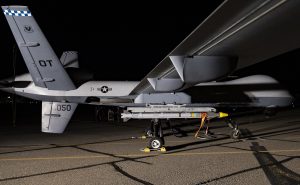
The Air Force Life Cycle Management Center’s MQ-9 program office at Wright-Patterson AFB, Ohio said on Apr. 20 that it is upgrading the General Atomics drone to counter near-peer adversaries--Pentagon-speak for China and Russia. While U.S. Central Command (CENTCOM) has relied upon the MQ-9 Reaper as a strike and intelligence, reconnaissance and surveillance (ISR) platform against extremist organizations, "that mission is now shifting," AFLCMC said. As such, AFLCMC this month plans to award General Atomics the first delivery order for…














